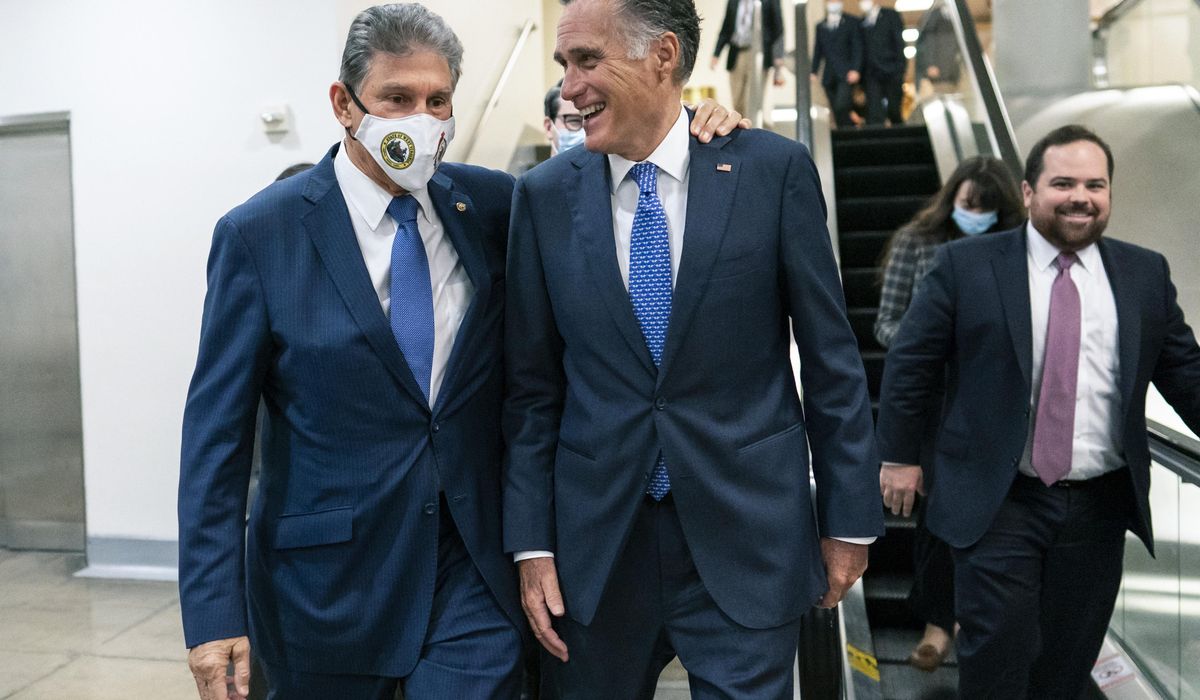
Mitt Romney said Sunday the White House never reached out to him on voting rights even though the Utah Republican is one of the few GOP senators who might be open to a bipartisan overhaul of election laws.
Mr. Romney‘s criticism of the president’s leadership comes as Democrats forge ahead with a likely ill-fated plan to blow up Senate filibuster rules and ram through a partisan plan.
The former Republican presidential nominee said he is working with a dozen Democrats and Republicans on ways to strengthen the Electoral Count Act after the chaos that culminated with the Jan. 6, 2021, attack on the U.S. Capitol, so it was disappointing to see the White House try and muscle through alternative plans that GOP lawmakers view as a federal takeover of elections.
“Sadly, this election reform bill that the president has been pushing, I never got a call on that from the White House. There was no negotiation bringing Republicans and Democrats together to try and come up with something that would meet bipartisan interest,” Mr. Romney told NBC’s “Meet the Press.”
“They want a real dramatic change,” Mr. Romney said of Democratic leaders. “They feel that instead of elections being run at the state level, they should really be managed and run at the federal level. And recognize the founders didn’t have that vision in mind. They didn’t want an autocrat to be able to pull the lever in one place and change all the election laws. Instead, they spread that out over 50 states.”
Democrats say their voting bills are needed to overrule a slew of election integrity measures that have been enacted in GOP-led states since 2020.
They are pushing The Freedom to Vote Act, which would require states to offer same-day voter registration, make Election Day a national holiday and mandate 15 days of early voting. It also would require universal vote-by-mail, create a taxpayer-backed public-financing system for House elections and impose new restrictions on the ability of states to draw their electoral districts.
A second bill, the John Lewis Voting Act, would grant the Department of Justice sweeping new powers to oversee state elections. In some cases, according to the bill, states would even have to secure the DOJ’s approval before implementing new voting laws.
The House passed the bills last week, but Democratic Sens. Kyrsten Sinema of Arizona and Joe Manchin III of West Virginia oppose weakening rules that require a 60-vote threshold to end debate and move forward on bills. President Biden made a fiery speech in support of voting rights in Atlanta and met with Ms. Sinema and Mr. Manchin last week, but neither seemed to change their mind, putting the legislative effort in doubt.
House Majority Whip James E. Clyburn on Sunday insisted the effort is not dead.
“They may be on life support,” the South Carolina Democrat told CNN’s “State of the Union.” “We’re not giving up.”
Mr. Clyburn said Democrats might have to go back to the drawing board and find measures that Republicans like Mr. Romney can support. But he wants the Senate to try and move the existing bills forward even if it shines a light on Democratic disunity.
“When people tell me they are for this legislation, but they’re against the processes that we need in order to get the legislation, then I don’t think you’re on the right side of history. So we ought to fight. We’ve got to have these votes. We’ve got to see which side people are on,” Mr. Clyburn said.
He said it if fails, as predicted, then Congress can lean into bipartisan efforts to shore up the electoral-vote counting process and protect election workers. But first, he wants to challenge new state laws ahead of the mid-term cycle.
“Remember now, the Electoral College will not kick in until 2024. I want to know what’s going to happen in 2022 when someone is standing in a line and need a drink of water,” Mr. Clyburn said, alluding to new state restrictions on assistance for people waiting in line at the polls.
Sen. Tim Kaine, Virginia Democrat, said lawmakers “have to be recorded at this moment in time about where are we in protecting the right to vote.” He said senators will debate the merits of the bills and various rule changes that could get the measures across the finish line.
“Right now, it doesn’t look like it has the votes to pass, but we’re going to cancel our Martin Luther King Day recess and be there this week because we think it’s so important for the country,” Mr. Kaine told CBS’s “Face the Nation.” “And we will be voting, both on the bills, but also on if we can’t get Republican support for the bills.”
Mr. Biden might have hurt efforts to bring Republicans into the fold by delivering a fiery speech ahead of the Martin Luther King Jr. holiday that compared the choice on voting reforms to choosing between Abraham Lincoln or Confederacy leader Jefferson Davis.
Mr. Romney said Mr. Biden needs to take a deep breath and determine what he wants to accomplish.
“And if it’s to try and transform America, he is not going to unite us,” Mr. Romney told NBC. “Bringing us together means finding a way to work on a bipartisan basis. He had one success, the infrastructure bill, and that was done by Republicans and Democrats in the Senate working together. Build on that kind of success.”
Democrats’ most immediate concern is inside their own party.
Ms. Sinema’s speech against changing the rules enraged liberal activists, and former Secretary of State Hillary Clinton appeared to jeer her and Mr. Manchin by repeating the late Martin Luther King Jr.’s warnings about “the White moderate.”
Mr. Clyburn stopped short of urging Rep. Ruben Gallego, Arizona Democrat, to launch a primary challenge against Ms. Sinema in 2024 but sang his praises.
“We’ll see what happens,” Mr. Clyburn said. “He’s a good guy.”
• Haris Alic contributed to this report.








